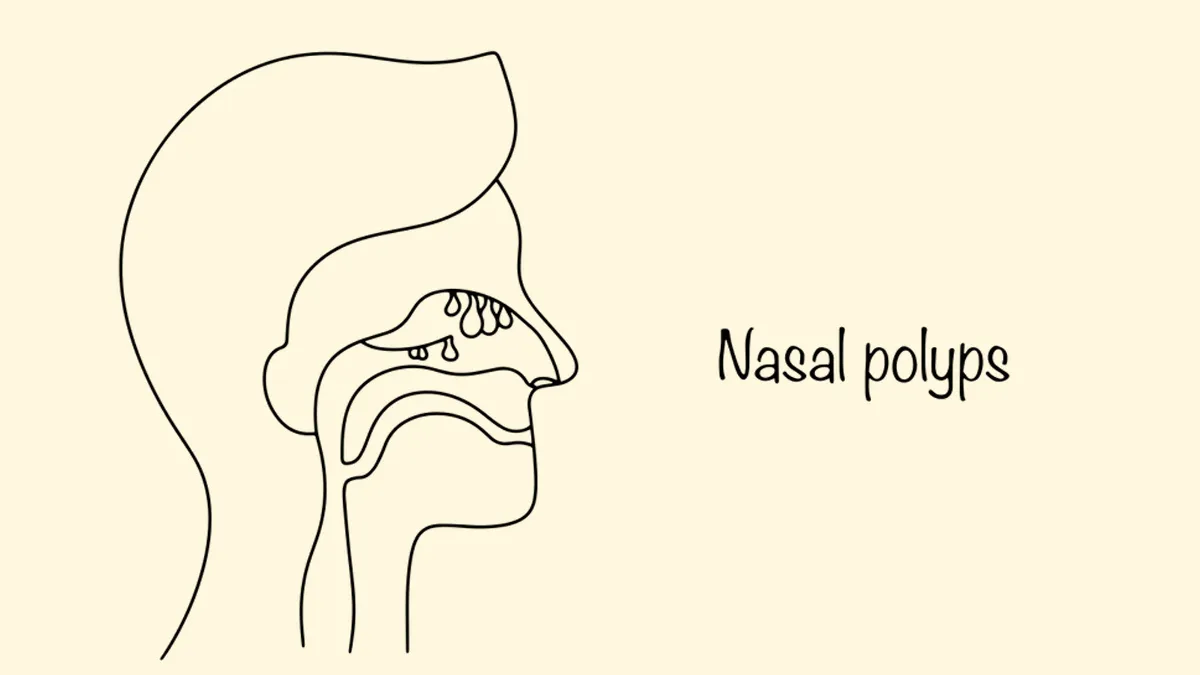
Nasal polyps are soft, painless growths on the lining of your nasal passages or sinuses, often resulting from chronic inflammation. While these benign growths themselves are not harmful, they can lead to uncomfortable symptoms and significantly impact your breathing, smell, and overall quality of life. Common symptoms include nasal congestion, reduced sense of smell, sinus pressure, and in severe cases, sleep disturbances due to obstructed airways. If nasal polyps grow large enough or multiply, they can block airflow and drainage in the nasal passages, potentially leading to recurrent sinus infections. Although the exact cause of nasal polyps is still being studied, certain health conditions and allergic responses are known to increase the risk of developing these growths.
Table of Content:-
To understand more about the causes of nasal polyps, OnlyMyHealth interacted with Dr Roohi Pirzada, MBBS, General Physician, Mumbai.
Dr Pirzada explains several conditions that are linked to nasal polyps. She emphasises “Most of these conditions have underlying inflammatory or allergic components, which lead to chronic inflammation in the nasal or sinus cavities and encourage the growth of polyps.” Here, we delve into six common conditions that can increase the risk of developing nasal polyps.
1. Allergies

Allergic reactions are one of the most common triggers of nasal polyps. When allergens, such as pollen, dust mites, or animal dander, enter the nose, they can cause the nasal passages to become inflamed. Dr Pirzada highlights "This inflammatory process can easily extend into the sinuses, leading to sinusitis and, ultimately, the growth of nasal polyps." For people with allergies, ongoing exposure to triggers may create a cycle of inflammation that contributes to polyp formation.
2. Asthma

Asthma is another condition that is frequently associated with nasal polyps. Dr Pirzada points out "Asthma and nasal polyps often go hand in hand, with both involving allergic or inflammatory pathways." While asthma primarily affects the lungs, it’s also part of the broader inflammatory response in the body, and this can affect the nasal passages. People with asthma are often prone to nasal inflammation, which can increase the likelihood of developing polyps. Conversely, nasal polyps can sometimes worsen asthma symptoms, creating a challenging cycle of respiratory issues.
3. Aspirin Sensitivity

Aspirin sensitivity is a lesser-known but significant contributor to nasal polyps. Dr Pirzada explains, “People with nasal polyps are more likely to be sensitive to aspirin and other NSAIDs (nonsteroidal anti-inflammatory drugs).” This sensitivity can trigger respiratory symptoms and inflammation in susceptible individuals. Known as Aspirin-Exacerbated Respiratory Disease (AERD), this condition is marked by a combination of nasal polyps, asthma, and reactions to aspirin or other NSAIDs. People with AERD must be cautious with their medication choices, as even a small dose of aspirin can worsen nasal and respiratory symptoms.
4. Cystic Fibrosis

Cystic fibrosis (CF) is a genetic condition that affects the production of mucus in the body. Individuals with CF tend to have thick, sticky mucus that can clog airways, creating a favorable environment for infections and inflammation. Dr Pirzada notes, "A sweat test is often used to determine if a child with nasal polyps has cystic fibrosis." The chronic sinus and nasal passage inflammation seen in CF patients significantly raises their risk of developing nasal polyps.
5. Dental Infections

Dental infections can indirectly contribute to the development of nasal polyps. According to Dr Pirzada, “Infections in the upper teeth or jaw can spread to the sinuses, causing inflammation that increases the risk of nasal polyps.” This is particularly common with infections that affect the roots of the teeth, as they are close to the sinuses. Addressing dental health issues is an important, and often overlooked, step in reducing the risk of nasal polyps.
Also read: Expert Explains Nasal Polyps: Symptoms, Causes, Diagnosis, & Treatment
6. Vitamin D Deficiency

Recent studies suggest that vitamin D deficiency may play a role in the formation of nasal polyps. Dr Pirzada states, "Vitamin D deficiency is linked to an increased incidence of nasal polyps." Vitamin D is essential for a healthy immune system, and low levels can lead to increased inflammation. Ensuring adequate vitamin D levels may help reduce the risk of nasal polyps, especially in individuals prone to respiratory or allergic conditions.
7. Hay Fever

Hay fever, or allergic rhinitis, is closely linked to the development of nasal polyps. “Hay fever is often caused by the same allergens that trigger nasal polyps, making allergic responses a prominent factor in their formation,” Dr Pirzada explained. This chronic allergic reaction leads to continuous inflammation of the nasal passages, creating an environment where polyps can easily develop.
Managing Nasal Polyps
Treatment for nasal polyps often involves managing the underlying conditions contributing to their growth. Medications such as corticosteroids can help reduce inflammation, while allergy treatments may help alleviate symptoms and prevent polyp formation. In some cases, surgery may be necessary to remove large or obstructive polyps.
If you experience persistent nasal congestion, a reduced sense of smell, or symptoms associated with any of these conditions, consider consulting with a healthcare professional. Addressing these underlying issues can help you manage or even prevent nasal polyps, improving your respiratory health and overall quality of life.
Also watch this video
How we keep this article up to date:
We work with experts and keep a close eye on the latest in health and wellness. Whenever there is a new research or helpful information, we update our articles with accurate and useful advice.
Current Version
